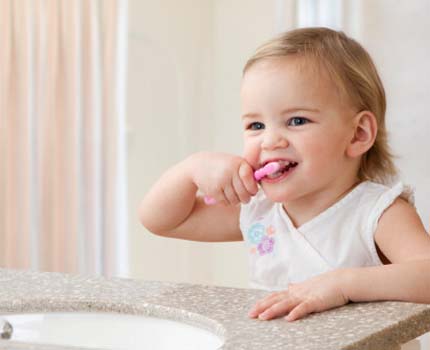 Teaching your children good oral hygiene and healthy nutritional habits will help ensure strong and healthy teeth for life. HEALTH speaks to Dr. Sangeeth Radhakrishnan, Specialist Pediatric Dentist at GMC Hospital in Ajman to learn the best ways to ensure your child’s teeth are in optimal health.
Teaching your children good oral hygiene and healthy nutritional habits will help ensure strong and healthy teeth for life. HEALTH speaks to Dr. Sangeeth Radhakrishnan, Specialist Pediatric Dentist at GMC Hospital in Ajman to learn the best ways to ensure your child’s teeth are in optimal health.
Infants
After breast feeding or bottle feeding, Dr. Radhakrishnan explains that it is advisable to rinse away the milk residues from the surface of the teeth. “For infants at increased risk of tooth decay consult a Pediatric Dentist about brushing with fluoridated toothpaste,” he notes while for infants six months and older fluoride supplements can be given but only by the recommendation of a dentist or a pediatrician; based on the water fluoride level.
In case the infant has sore gums caused by tooth eruption, Dr. Sangeeth Radhakrishnan advises to provide the infant with a clean teething ring, cool spoon, or even rub his gums with a clean finger. He advises regular dental check-ups by a Pediatric dentist for the toddler.
Milk Teeth
The milk teeth, points out Dr. Radhakrishnan, usually erupt into the oral cavity around the age of six months. “The first tooth to erupt into the oral cavity is usually the lower central incisors and by the age of 30 to 36 months, usually all of the twenty milk teeth have erupted,” he says.
Preventing Caries in Small Children
In children age one and below, Dr. Radhakrishnan enforces that the initiation of a program to ensure an optimal environment for oral health should begin in infancy. “The preventive program includes many facets- dietary management, optimal systemic fluorides and removal of plaque,” he says. “Even before the tooth erupts, it’s advisable to use a clean damp cloth or an infant toothbrush with a small head using plain water to clean the gum pads after feeding.” Once the teeth have erupted, a wet soft-bristled brush can be gently wiped over the teeth. Then, when a number of teeth have erupted, Dr.Radhakrishnan points out that a more thorough and systematic routine should be established in which one makes sure to clean all surfaces of the teeth in both the upper and lower jaws.
Older Children
As the child gets older, Dr.Radhakrishnan explains that many want to clean their own teeth. “Parents need to understand that fine motor movements are not still developed completely, therefore supervision and removal of plaque from missed areas should be provided,” he says as children have a limited ability to expectorate, dentifrices with fluoride should be used sparingly. If a fluoride dentifrice is used, he advises a very small amount (pea-size) should be placed on the brush and cleaning completely performed or supervised by the parent.
How to select a tooth brush
Tooth brushes are available in many shapes, colors, sizes and designs. Brushes with soft rounded nylon bristles are recommended, says Dr. Radhakrishnan. “The size of the head, angle of the head, size and shape of the handle all depend on the child’s and parent’s preferences,” he says. “A design that works best in their hands and gets the cleaning and massaging completed is the brush to use.”
First Dental Check-up
According to Dr. Radhakrishnan, in 1986, the American Association of Pediatric Dentists adopted a position on infant oral health recommending that the first visit of the child to the dental clinic should be within six months of the primary teeth eruption.
Advice
- Give fluoride supplements but only as recommended by a dentist or physician based on the level of caries risk.
- Discuss with the dentist the possibility of topical fluoside application and dental sealants treatment.
- Regular dental check-ups are paramount.
Foods to Avoid
- Avoid or reduce the frequent intake of sugary foods or juices to prevent caries.
- Make sure the child brushes the teeth after consuming sticky or sugary food.
- Avoid junk food and encourage healthy eating habits.
Breast Feeding
From a nutritional point of view, Dr. Radhakrishnan says that breast milk has several systemic and immunological advantages over proprietary formulas. Thus its importance cannot be overemphasized. “However on the flip side, prolonged and at will breast feeding beyond the stipulated weaning time, especially throughout night and throughout day has been associated with nursing caries,” he says.

